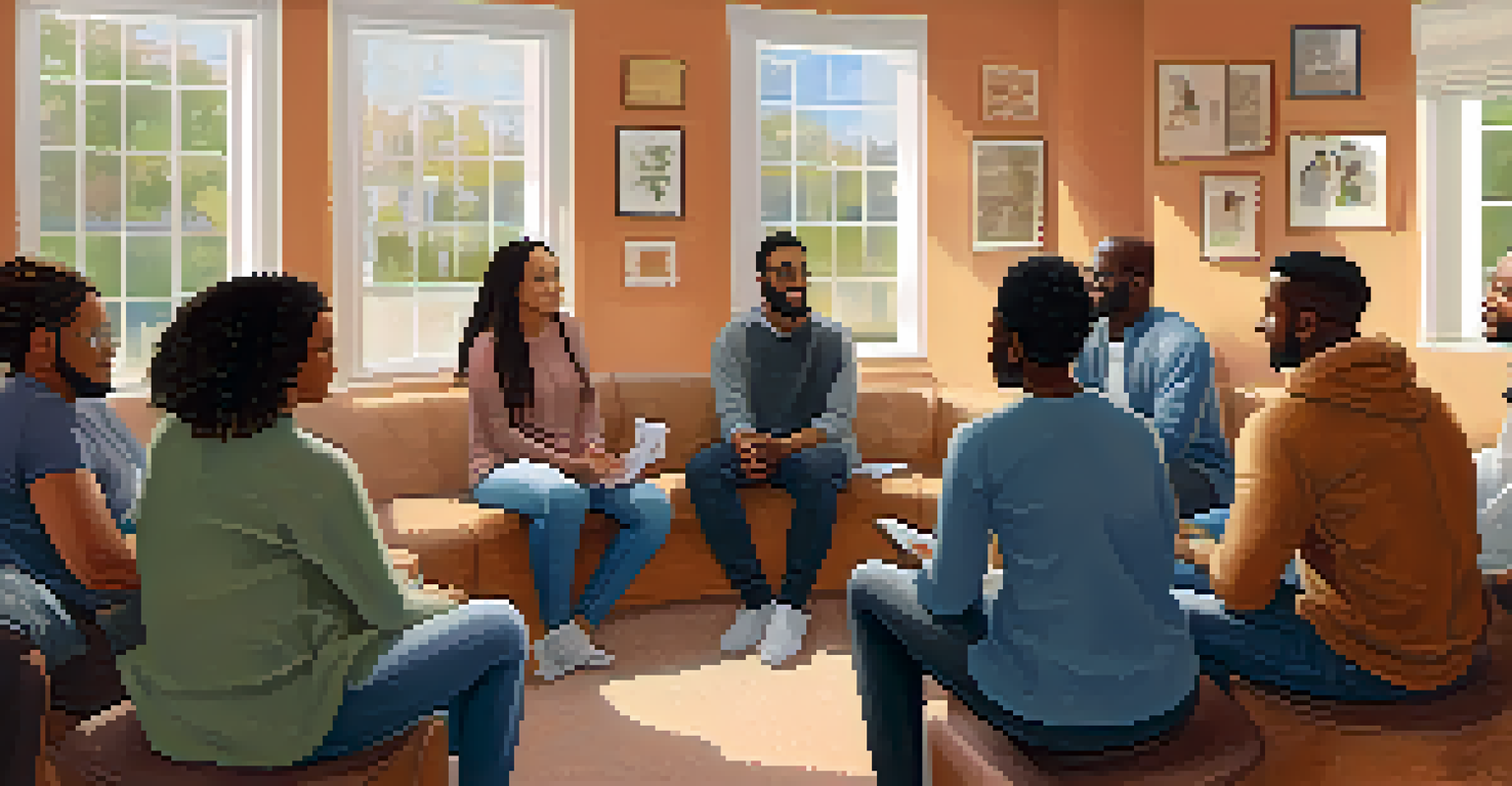Accessibility of Mental Health Services in Los Angeles

Overview of Mental Health Services in Los Angeles
Los Angeles is home to a diverse population, and with that comes a wide array of mental health needs. The city boasts numerous mental health services, including private practices, community clinics, and non-profit organizations. However, the accessibility of these services can vary greatly depending on location, socioeconomic status, and cultural factors. Understanding this landscape is crucial for those seeking help and support.
Mental health is not a destination, but a process. It's about how you drive, not where you're going.
Many residents may not be aware of the extensive resources available in the city. For instance, organizations like the Los Angeles County Department of Mental Health offer services tailored to children, adults, and families. However, navigating this system can often feel overwhelming, especially for those already facing mental health challenges. It’s essential to break down these barriers to ensure everyone can access the care they need.
Moreover, the stigma surrounding mental health often prevents individuals from seeking help. Many people may feel uncomfortable reaching out due to fears of judgment or misunderstanding. This stigma can be particularly pronounced in certain communities, making it vital for mental health services in Los Angeles to promote inclusivity and awareness.
Barriers to Accessing Mental Health Services
Despite the resources available, significant barriers to accessing mental health services persist in Los Angeles. One major hurdle is the lack of insurance or inadequate coverage, which can limit the types of services available to individuals. Many low-income residents may rely on Medi-Cal, but not all providers accept this insurance, creating a gap in care.

Transportation is another barrier many face, especially in a sprawling city like Los Angeles. Public transport options may not be convenient or safe, leaving individuals without reliable means to get to appointments. This can lead to missed sessions and ultimately decreased chances of recovery.
Barriers to Mental Health Access
Many individuals in Los Angeles face significant obstacles such as lack of insurance, transportation issues, and long wait times for appointments that hinder their access to mental health services.
Additionally, there's the issue of wait times for appointments. Many mental health professionals are overbooked, making it difficult for individuals to get timely care. This can be particularly frustrating for those in crisis who need immediate support, emphasizing the need for more accessible and responsive services.
Cultural Competence in Mental Health Care
Cultural competence is essential in providing effective mental health care, especially in a city as diverse as Los Angeles. Health professionals need to understand and respect the cultural backgrounds of their clients to foster trust and promote healing. This includes being aware of different beliefs about mental health and varying communication styles.
The greatest weapon against stress is our ability to choose one thought over another.
For example, certain communities may have traditional practices for addressing mental health issues that differ from conventional therapy. By recognizing and integrating these practices, mental health providers can create a more welcoming environment for clients. This not only increases comfort but also enhances the likelihood of individuals seeking help.
Moreover, language barriers can significantly impact access to care. Offering services in multiple languages and employing bilingual staff can help bridge the gap for non-English speakers. This approach ensures that everyone has the opportunity to receive care that respects their identity and needs.
Telehealth: A Solution to Accessibility Challenges
In recent years, telehealth has emerged as a promising solution to the accessibility challenges faced by many seeking mental health services. By providing therapy and counseling through video calls or phone sessions, telehealth eliminates some of the barriers associated with in-person visits. This can be especially beneficial for those who may struggle to find transportation or who live in remote areas.
The COVID-19 pandemic accelerated the adoption of telehealth, and many providers have since recognized its potential. Patients appreciate the flexibility and convenience of being able to connect with therapists from the comfort of their homes. Moreover, it allows individuals to seek help without the fear of being seen by someone they know at a clinic.
Importance of Cultural Competence
Culturally competent care is essential in Los Angeles, as understanding diverse backgrounds and practices can significantly enhance trust and healing in mental health treatment.
However, it’s important to note that telehealth is not a one-size-fits-all solution. Some individuals may prefer in-person interactions for various reasons, including the comfort of face-to-face communication. It's crucial for mental health services to offer a range of options to meet diverse needs.
Community Resources for Mental Health Support
Los Angeles offers a wealth of community resources aimed at improving mental health support. Organizations like the Los Angeles Mental Health Center and the National Alliance on Mental Illness (NAMI) provide valuable services, including support groups, educational workshops, and crisis intervention. These resources are often free or low-cost, making them accessible to a wider audience.
Peer support programs have also gained popularity, allowing individuals to connect with others who share similar experiences. These programs can foster a sense of belonging and reduce feelings of isolation, which are common among those dealing with mental health challenges. This community-driven approach often leads to improved outcomes and satisfaction.
Additionally, local universities and colleges frequently offer counseling services to students and the community. These services not only provide affordable care but also allow trainees to gain experience under supervision. This symbiotic relationship enhances the overall mental health resources available in the city.
The Role of Advocacy in Mental Health Accessibility
Advocacy plays a crucial role in improving the accessibility of mental health services in Los Angeles. Various organizations are actively working to raise awareness about mental health issues and push for policy changes that promote better access to care. This includes advocating for increased funding for mental health programs and more inclusive insurance policies.
Grassroots movements have also emerged, empowering individuals to share their stories and experiences. By highlighting the challenges faced by those with mental health issues, advocates can inspire change and encourage others to seek help. This collective voice is essential for dismantling the stigma surrounding mental health.
Telehealth's Role in Accessibility
Telehealth has emerged as a vital solution to accessibility challenges by offering therapy remotely, making it easier for individuals to access support from their homes.
Moreover, partnerships between community organizations, government agencies, and mental health professionals can lead to innovative solutions. Collaborative efforts can result in more comprehensive care models that address the multifaceted nature of mental health needs in diverse populations.
Future Directions for Mental Health Services in Los Angeles
Looking ahead, the future of mental health services in Los Angeles seems promising yet challenging. As awareness of mental health issues continues to grow, there is a pressing need for more comprehensive and accessible services. This includes expanding telehealth options and investing in community-based programs that cater to underserved populations.
Furthermore, ongoing training for mental health professionals in cultural competence and trauma-informed care is essential. As the landscape of Los Angeles continues to evolve, it's important for providers to stay informed about the unique needs of their communities. This ensures that care remains relevant and effective.

Finally, fostering a culture of openness about mental health is vital. Engaging in conversations about mental health in schools, workplaces, and communities can help reduce stigma and encourage individuals to seek help. By prioritizing mental health as a community value, Los Angeles can pave the way for a healthier future for all its residents.